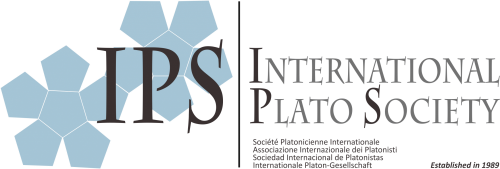 οὐδὲ γὰρ οὐδὲ βίη ῾Ηρακλῆος φύγε κῆρα
οὐδὲ γὰρ οὐδὲ βίη ῾Ηρακλῆος φύγε κῆρα
Homer, Ilias, Σ 217
Last week, on Wednesday, July 22nd, Aleš Havlíček, Professor of Philosophy, a former president of the Czech Plato Society and an active member of the International Plato Society, met an untimely death in Prague. On Saturday, July 11th, he suffered a cerebral haemorrhage which turned out to be fatal, despite the best medical assistance available and the prayers of his family and friends.
Aleš Havlíček was born in 1956 in Třebíč, Czechoslovakia. After graduating from a high school specializing in nuclear physics, he studied from 1975 to 1980 at the Faculty of Nuclear Sciences and Physical Engineering of the Czech Technical University in Prague. At the same time, he engaged in the study of philosophy in circles of dissidents and human rights activists who had been expelled from the universities by the communist regime. As a consequence, he was forbidden from completing his studies and graduated only in 1985, with a degree in electrical engineering from Brno University of Technology. During the 80s, he participated consistently and enthusiastically in philosophy courses in Prague organized outside academia (the English-speaking reader can get a taste of the atmosphere of that time and place from Roger Scruton’s recent Notes from Underground, as well as from Barbara Day’s Velvet Philosophers). Aleš’s most important mentor was Ladislav Hejdánek, an original Czech philosopher who was inspired by A. N. Whitehead and the Czech biologist and philosopher Emanuel Rádl. Already in these years, however, Aleš developed a deep interest in ancient philosophy, learned Greek, and fell in love with Plato, who had been his guiding star ever since.
After 1989, when the freedom had been restored to his country, Aleš embarked on an academic career in philosophy and specialized in political thought. From 1990 to 2007 he taught at the Faculty of Social Sciences of the Charles University in Prague and from 2008 he was Professor of Philosophy at the Jan Evangelista Purkyně University in Ústí nad Labem, where he served as the dean of the Faculty of Arts from 2011 until his death.
In 1997 Aleš gathered together a handful of friends and colleagues working on Plato and ancient philosophy and established the Czech Plato Society. From 1997 to 2001 he was its vice-president, from 2001 to 2007 its president, and until his death its very soul. On his initiative, the Czech Plato Society launched annual symposia, both international and national. The First International Symposium Platonicum took place in 1997, followed by the first national symposium in 1998. There has been a regular alternation between the two symposia ever since. The Republic and Laws, Phaedo, Protagoras, Symposium, Parmenides, Theaetetus, Sophist, Statesman, and Philebus were dealt with at international gatherings, while the Meno, Lysis, Hippias Minor, Charmides, Euthydemus, Alcibiades Maior, Hippias Maior, Io and Apology were discussed at gatherings held in Czech. The Proceedings of both symposia have appeared since 1998. Over the years, Aleš served as either the editor or co-editor of all of them. From the very beginning, he established close ties with the International Plato Society and many prominent members of the IPS have attended Prague symposia. Unlike the IPS’ Symposium Platonicum, the international symposia in Prague have been organised on a smaller scale with the aim of leaving enough room for in-depth discussions on the papers delivered. Many members of the IPS will remember Aleš both from the IPS and from the Prague Symposia Platonica.
As an interpreter of Plato, Aleš took a quite unorthodox stand. Like others, he emphasised Plato’s tricky stage settings in the dialogues and tended to play down their seemingly dogmatic tenets in epistemology and metaphysics. On the other hand, he was profoundly inspired by Plato’s ethics and took the orientation of the soul towards the Good to be the very heart of Plato’s philosophy. As a result, his way of understanding Plato was a very Socratic one, as was his way of life.
For his country, Aleš’s death is an immeasurable loss. In addition to all his intensive activities as a teacher, researcher and organizer of scientific life, Aleš was, for quarter a century, by far the most important publisher of philosophical literature in the Czech Republic. In 1991 he launched an important book series and few years later he established the OIKOYMENH publishing house, a non-profit organisation aiming at the diffusion of philosophical and theological literature. The roots of this endeavour lay deep in the 70s and 80s, when this sort of literature had been largely prohibited by the communist regime on ideological grounds and dissidents diffused it in the form of typewritten manuscripts. At the beginning of the 90s, Aleš began to publish what had been written and translated “in the underground” over the course of the previous years. But very soon, he launched new titles, editions, translations, commentaries etc. One of his first feats was a new edition of Plato’s complete works in František Novotný’s excellent Czech translation. By 2015, the OIKOYMENH publishing house, run vigorously by Aleš, had issued 500 titles of philosophical and theological literature of the highest quality, both classical and contemporary.
Aleš was a hero in the ancient sense of this word, a man of great deeds, an outstanding personality, leaving an indelible trace and a glorious memory behind him.
He will be buried in Prague, at the Břevnov Cemetery, after obsequies held at St Margaret Church in the Břevnov Monastery on Thursday, July 30th, 2015 at 10:30 am.
Filip Karfik
